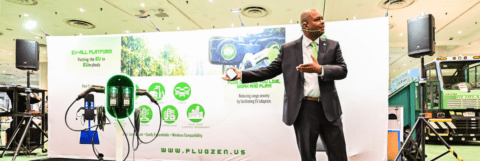Crain’s Detroit Business
Kurt Nagl
Sept. 14, 2022
Electric vehicle charging startup Plug Zen LLC has signed a deal with Detroit Manufacturing Systems LLC to make EV charging stations with a focus on underserved communities.
The Detroit-based, minority-owned companies are joining forces to bring the multi-vehicle charging units to market by next year, said Kwabena “Q” Johnson, founder and president of Plug Zen.
Johnson said the deal, set to be announced Wednesday at the North American International Auto Show, marks an important step toward sustainability for the startup, founded in 2020.
“That’s a huge step for us,” he said. “A lot of people wonder how it’s made, who’s making it, and that solves a big piece of the puzzle. They have 20 years’ experience in the space.”
Financial terms of the deal were not disclosed.
Johnson said the company will make at least 2,000 units in the first year. Detroit Manufacturing Systems will do final assembly of the charging stations at its plant on the west side of the city.
Plug Zen is among dozens of startups vying for a piece of the EV charging pie. Johnson said his startup aims to differentiate itself with a modular design and with a focus on minority communities, as the fast-moving transition to EVs has sparked concerns about equity and affordability.
“Our focus is diversity, equity and inclusion,” Johnson said. “We want to make sure underserved communities have a voice in the conversation about climate change. Our technology will level the playing field.”
Plug Zen’s charging hubs cost around $2,000 per unit to install, but additional plug outlets can be stacked on for $300 to $400 each, which is the value proposition, Johnson said. Target customers are property owners from single-family housing to dealerships and municipalities.
The startup also plans to introduce at the auto show a new in-vehicle charging concept that allows vehicles to plug into standard three-pronged outlets for electricity.
Johnson said the startup has raised $350,000 and is aiming to double that in the next few months. With two full-time and three part-time employees, Johnson said he expects revenue to start coming in early next year. He hopes to be profitable within the next two years.
“Our goal is to put these in underserved communities,” Johnson said.


